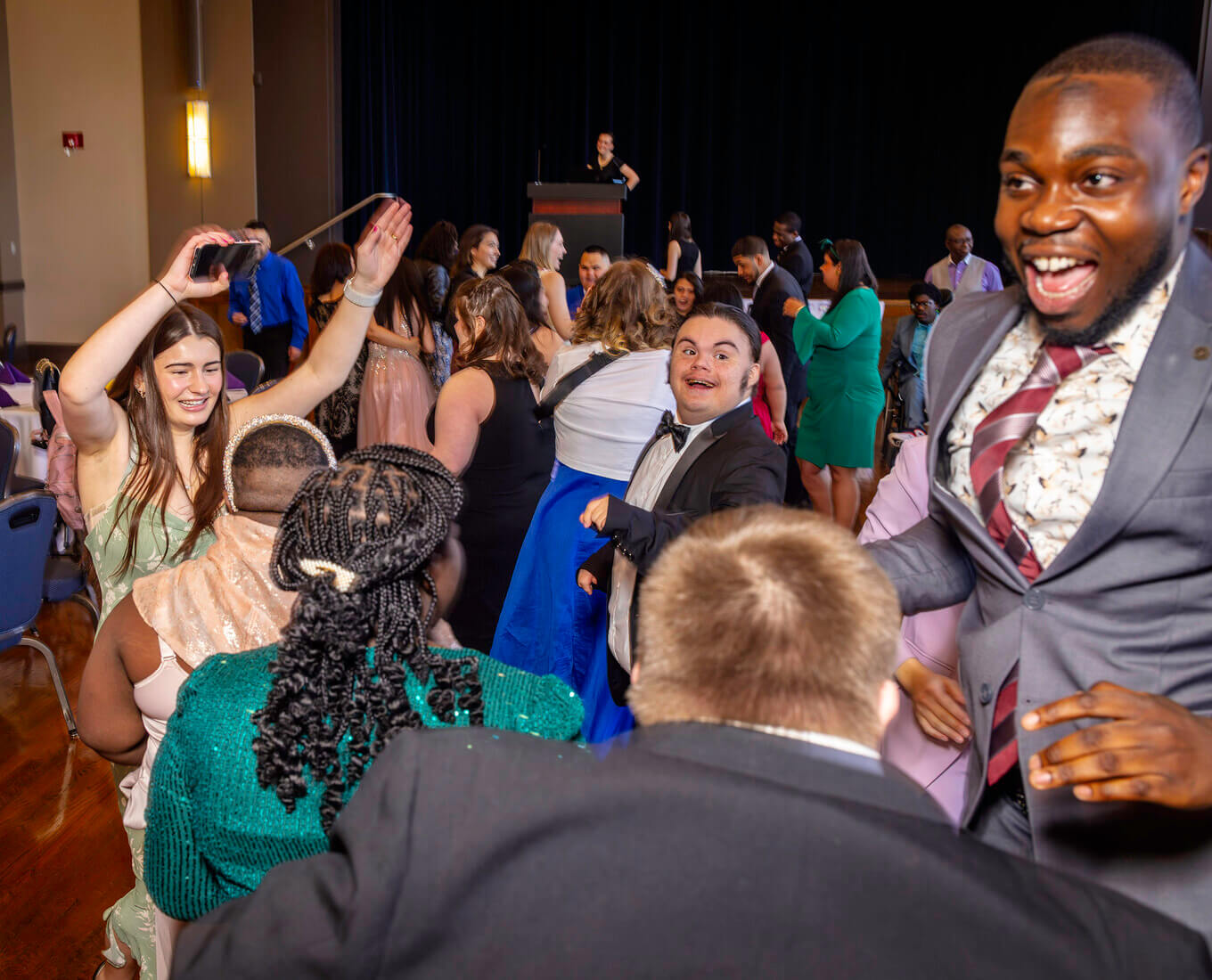. "Our Jesuit numbers are significantly smaller than they were 30 years ago, therefore we cannot simply rest and say, 'Oh, it's the Jesuits who have to take care of this, or the VP for mission who has to take care of this.' We are intentional in the 21st century about providing programs and initiatives for the community members — faculty, staff, administration, board of trustees — to immerse themselves in the Jesuit mission and experience."
While all Jesuit colleges and universities — and most Catholic schools — have a mission officer in some capacity, Fr. Campbell emphasizes that the College's commitment to the Jesuit mission is strong, and ample resources are dedicated to how it is fostered today, with an increased emphasis on what he calls "our shared responsibility."
New Ways for New Times
"Ignatius makes clear in the Spiritual Exercises that the role of the spiritual director is to accompany, to stay out of the way and let God work directly with the person making the Exercises," says Margaret Freije, provost and dean of the College.
Through their own mission-related opportunities, education and experiences, the faculty, staff and College community accompany Holy Cross students much like a spiritual director supports a retreat goer during the Exercises, the most profound experience of Ignatian spirituality. And, thus, faculty and staff are equipped with the skills to embody the charism and pass it on.
All faculty, staff and administrators new to campus receive "The Purple Book," the unofficial name of a compact guide that highlights the College's history and explains the life of St. Ignatius, the founding of the society, its spirituality and mission. Fr. Campbell calls the book "a common text for understanding Ignatian spirituality." The College's new employee orientation also includes a presentation on the Jesuits and their spiritual tradition.
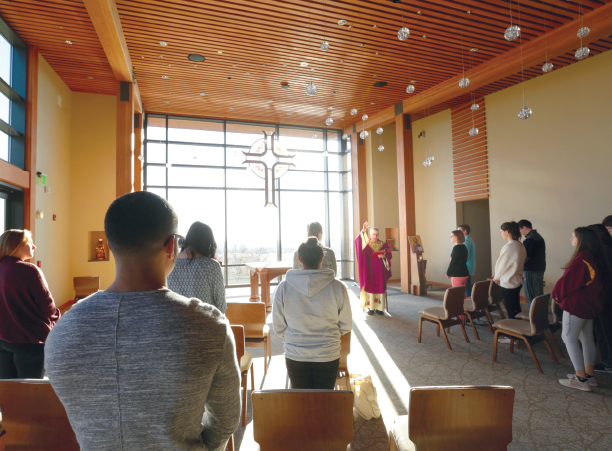 Rev. James Hayes, S.J. '72, presides over the Spiritual Exercises at the Joyce Contemplative Center in West Boylston in 2017. Photo by Tom Rettig
Rev. James Hayes, S.J. '72, presides over the Spiritual Exercises at the Joyce Contemplative Center in West Boylston in 2017. Photo by Tom RettigAnd all faculty and staff are invited to participate in "The Spiritual Exercises of St. Ignatius of Loyola in Everyday Life," an annual opportunity that stretches the traditional 30-day retreat experience across an entire academic year. Participants meet weekly with a spiritual director from the campus community, as not everyone has the ability to remove themselves from the world for 30 days like Ignatius once did.
More than 130 faculty and administrators have participated in Holy Cross' Ignatian Pilgrimage, an annual summertime trip to key sites in the life of St. Ignatius Loyola. The College has offered the pilgrimage since 2003, and participants have called it a transformative experience, much like what Ignatius himself experienced at the Benedictine abbey of Montserrat.
Ignatius arrived at Montserrat, outside of Barcelona, questioning his life as a soldier. While recovering from a battle injury caused by a cannonball that tore through his leg, the saint in the making wondered if his life might have a larger purpose. He climbed to the monastery at the top — the jagged peaks of those serrated mountains mirroring his fractured ambitions for his life — waiting and asking for a sign from God.
The monastery at Montserrat is dedicated to Mary, and once he arrived there, Ignatius spent a night in prayer before the statue of Our Lady. After this life-changing night, Ignatius famously decided to lay down his sword and dedicate his life to service to God and others.
Brenda Hounsell Sullivan, who has worked at Holy Cross for 18 years and currently serves as assistant dean and director of student involvement, went on the pilgrimage in 2016 and says she is still reflecting and processing the experience.
"Walking in the footsteps of St. Ignatius Loyola and really understanding the pedagogy and the real experiences of what it means to understand his story, it was a time to pause and think about how his life relates to everything we do," Hounsell Sullivan says. "Being grounded in the Catholic tradition helps me to have the freedom to express faith and have conversations about faith and spirituality with students and colleagues. On a daily basis, I am able to contemplate questions of who I am, who do I want to be for others, and how do I prepare myself every day to be the best that I can be to serve the students and the Holy Cross community. The mission is ingrained in what we do from the top down."
Every three years, members of the board of trustees are also invited on a separate Ignatian Pilgrimage to Spain and Rome, where they study the history of the Society of Jesus and meet Jesuit leadership.
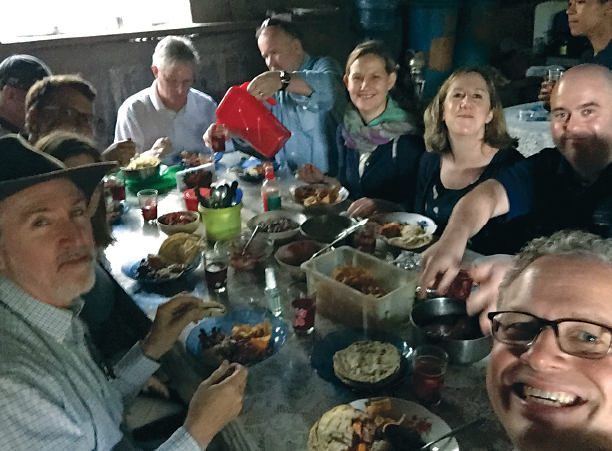 Biology Professor Rob Bellin takes a selfie with his Ignatian Colleagues Program group during a cultural immersion trip to Nicaragua this year.
Biology Professor Rob Bellin takes a selfie with his Ignatian Colleagues Program group during a cultural immersion trip to Nicaragua this year."Our Jesuit identity is interwoven into everything we do — it isn't that there is an office across campus that is going to worry about having the students think about others," says Bellin, who has worked at the College for 16 years. "This institution draws and fosters people who are interested in really engaging with the students they are teaching, and as part of that, you end up leading by example and talking about what it means to be a scholar or a researcher while bringing ethical issues into discussions."
Bellin also finds that Ignatian spirituality is an integral and inherent part of his classes. "It isn't a problem or doesn't seem awkward to have discussions about how you can be a scientist or a doctor and also think about making the world a better place. That may be a strange discussion to have with a student at another place," he says. "We aren't just talking to students about how they get into med school, but rather, what should the principles be by which they live their lives?"
Thanks to the pilgrimage, the ICP and AJCU conferences, Bellin not only feels well equipped to engage with students in these conversations, but he also makes it a personal priority.
"I love being a part of this focus on men and women for others — the education of students who are going to be really good chemists or accountants, but who are also looking out for the good of the world and other people," he says. "It is not just in word, it is what Holy Cross really does, and that is a very Jesuit thing, learning to think about people outside of themselves as they move forward into their lives."
"Ignatius went up that hill and it was a transformative experience for him. We hope for our students, that they will come up this hill and have a transformative experience of their own," Fr. Campbell says. "I understand the role that this institution and this culture played in forming and shaping my own identity and decision to become a Jesuit, and, therefore, it is a privilege to have some shared responsibility in promoting this identity for a new generation of students."
Contemplatives in Action
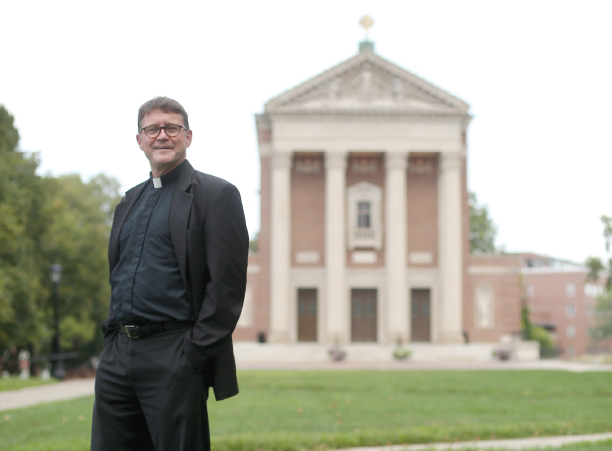 "It is a privilege to have some shared responsibility in promoting this identity for a new generation of students," says Fr. Campbell '87, vice president of mission. Photo by Tom Rettig
"It is a privilege to have some shared responsibility in promoting this identity for a new generation of students," says Fr. Campbell '87, vice president of mission. Photo by Tom Rettig"Our Jesuit charism exists because we are a Catholic school and one cannot stand apart from the other," Fr. Campbell says. "The Jesuit charism animates our experience of Catholicism."
Prior to Vatican II, emphasis was placed on cultivating the mission in a liturgical sense. While that is still the heart and core of the community practicing their Catholic faith on campus, now the liturgical experience inspires the community to move out and become contemplatives in action.
"In reflecting on our faith, life and the fundamental questions, how does that bring us to action?" asks Frank Vellaccio, senior vice president emeritus of the College.
This shift — influenced by Vatican II changes in the Church and those of Rev. Pedro Arrupe, S.J., leader of the Jesuits at that time — has enhanced and expanded the way the Jesuit mission is lived on The Hill. In addition to daily Mass and the sacraments, the Office of the College Chaplains offers an abundance of programming, from retreats — including the five-day adaptation of the Spiritual Exercises — to community service and immersion programs.
"The chaplains' office is the center of faith life on campus," Kearns-Barrett says. "Through worship, retreat programs, opportunities for service and justice, and pastoral care, we provide Holy Cross students and other members of the College community with a recognizable Catholic center on campus, while at the same time serving as a place on campus where people of all faiths and beliefs are welcomed and supported. Students of every religious background and even students who do not have a faith participate in opportunities offered by the chaplains."
The Jesuit, Catholic identity of the College permeates the student experience at Holy Cross. Nearly 70 percent of the class of 2017 participated in programs offered by the chaplains' office during their time at Holy Cross, with nearly 250 of the 667 graduates attending a retreat.
Retreats have been an integral part of the Holy Cross student experience from the College's earliest days, and now the Thomas P. Joyce '59 Contemplative Center has elevated the retreat program.
Opened in 2016 in West Boylston, Massachusetts, and sitting on 52 acres overlooking the Wachusett Reservoir, the Joyce Contemplative Center is a dedicated 33,800-square-foot facility that offers programming ranging from first-year student overnight retreats to the five-day Spiritual Exercises. It is a place of reflection for all members of the College community, even if they do not elect to participate in a retreat. The facility also welcomes Montserrat classes, athletic teams and staff for reflective gatherings, reaching out to all facets of the campus community.
More than 100 students participate in the Spiritual Exercises annually, which are held four times a year at the Joyce Contemplative Center, and Kearns-Barrett estimates that Holy Cross has the most frequent and largest offerings of the Exercises for students among Jesuit schools.
Working for Change
Another hallmark program of the chaplains' office, and of the student experience at Holy Cross, is Student Programs for Urban Development, better known as SPUD. It's the largest student organization on campus and celebrates its 50th anniversary this year. With more than 500 student volunteers at 40 community partnerships, SPUD enables students to be men and women for and with others — the emphasis on "with." The program encourages building true relationships with marginalized people and considering the College's obligations to the Worcester community.
"Holy Cross' mission lives in its students, and where I've seen the mission most alive is in students advocating for change, both on and off campus," says Marie Therese Kane '18. "Their love for Holy Cross and the education that it has given them inspired them to work for change in things that they want to see on campus or they want to see in Worcester."
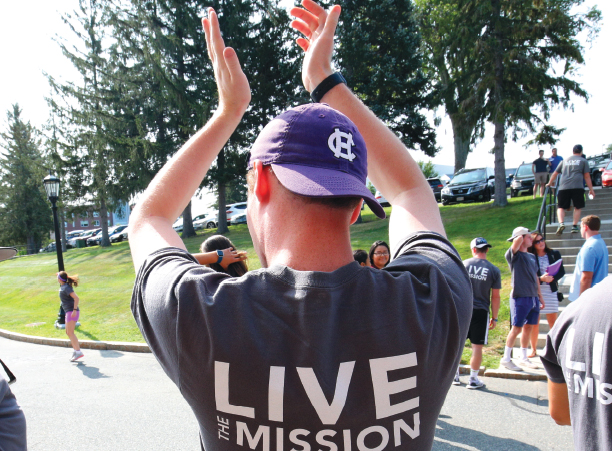 Move-In Day student volunteer dons a shirt emblazoned with the "Live The Mission" mantra. Photo by Tom Rettig
Move-In Day student volunteer dons a shirt emblazoned with the "Live The Mission" mantra. Photo by Tom RettigShe keeps a copy of the College's mission statement saved on the desktop of her computer, and the question of "What are our obligations to one another?" resonates deeply within her.
"Holy Cross has a lot of institutional, moral and political power to enact structural change with respect to climate change," she explains. "I saw that question as a call to look inward and think about how we can run the College in ways that are more in line with our mission. Our mission gives us the strength to shed light on issues that might not have a comfortable political consensus."
The College's mission is ingrained deeply into Kane's Holy Cross experience, and the same is true for her classmates, in part, because of the emphasis from their first day on campus. Orientation leaders wear T-shirts with "Live the Mission" emblazoned on the back, and the Jesuit mission is an integral part of the orientation programming.
Martin Dorsey '19, a sociology major from Wayne, Pennsylvania, chose Holy Cross for the opportunity to play varsity football. But starting from that first day on campus at orientation, he says he realized that his experience would include much more than he anticipated.
"I try to live the mission by giving back as an orientation leader," Dorsey says. "I want to make sure incoming students have as smooth a transition as possible. My freshman year, I remember that stress of being away from home, the anxiety of being in a new place, of not having that core friend group. I want to be a mentor to them in the first few days here and then have a relationship going into the school year, to be a resource that they can turn to on campus."
Hounsell Sullivan says her experience on her Ignatian Pilgrimage has flowed into all aspects of her work across campus. It is now a "lived experience" that she says can be applied to her daily interactions with students and colleagues.
"Our mission gives me the tools to approach doing business with a sense of sincere care for the people you interact with, as well as the future of the institution and the legacy," she says. "The experience a student might have at orientation, or an event, or walking into our office, they will leave a better person because they are informed on what the mission of the institution is and how it relates to what they become."
Through countless interactions each day, the sense of care and accompaniment is evident everywhere you turn.
"Clearly, our Jesuit and Catholic mission is being embraced generously by members of every constituency within the campus community," says College President Rev. Philip L. Boroughs, S.J. "Their creative appropriation of the Ignatian tradition in turn edifies and energizes the Jesuits who serve with them on Mount St. James and, together, we are 'finding God in all things' as we approach our shared future at the College of the Holy Cross with hope."
Written by Maura Sullivan Hill for the Summer 2018 issue of Holy Cross Magazine.
About Holy Cross Magazine
Holy Cross Magazine (HCM) is the quarterly alumni publication of the College of the Holy Cross. The award-winning publication is mailed to alumni and friends of the College and includes intriguing profiles, make-you-think features, alumni news, exclusive photos and more. Visit magazine.holycross.edu/about to contact HCM, submit alumni class notes, milestones, or letters to the editor.

